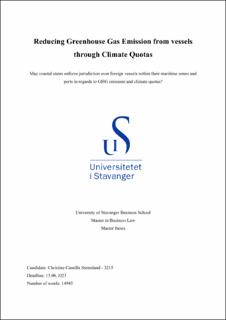| dc.description.abstract | We are failing to achieve the targets in the Paris Agreement, with no realistic path to 1,5 degrees Celsius in place. This thesis examines the potential of port and coastal states to regulate greenhouse gas emissions (GHG) from foreign vessels via climate quotas. Coastal states have the sovereign right to control port access and set entry conditions, which could lawfully consider a vessel`s entire journey to the port. This authority, as partially explored in the Norstar case, enables them to enforce climate quotas within their jurisdiction in line with treaty obligations. The intersection of UNCLOS and the Paris Agreement is vital for addressing climate change, GHG emissions, and ocean governance. The jurisdiction of coastal states over foreign vessels, coupled with their duty of due diligence, offers pathways for the application of climate quotas and GHG emission regulations. These could form part of an all-encompassing strategy to shield the marine environment from the negative impacts of climate change. | |
